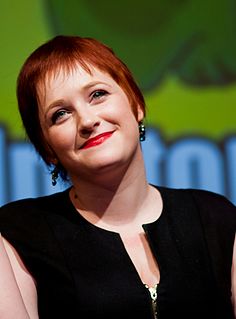A Quote by Richard P. Feynman
You see, one thing is, I can live with doubt and uncertainty and not knowing. I have approximate answers and possible beliefs and different degrees of certainty about different things... It doesn't frighten me.
Related Quotes
I think it's much more interesting to live not knowing than to have answers which might be wrong. I have approximate answers, and possible beliefs, and different degrees of uncertainty about different things, but I am not absolutely sure of anything. There are many things I don't know anything about, such as whether it means anything to ask "Why are we here?" I might think about it a little bit, and if I can't figure it out then I go on to something else. But I don't have to know an answer. I don't feel frightened by not knowing things, by being lost in the mysterious universe without having any purpose - which is the way it really is, as far as I can tell.
When it comes to controlling human beings there is no better instrument than lies. Because, you see, humans live by beliefs. And beliefs can be manipulated. The power to manipulate beliefs is the only thing that counts ... Who knows what use they’ll make of you? Maybe you’ll help them to persuade people to buy things they don’t need, or hate things they know nothing about, or hold beliefs that make them easy to handle, or doubt the truths that might save them.
We absolutely must leave room for doubt or there is no progress and there is no learning. There is no learning without having to pose a question. And a question requires doubt. People search for certainty. But there is no certainty. People are terrified — how can you live and not know? It is not odd at all. You only think you know, as a matter of fact. And most of your actions are based on incomplete knowledge and you really don’t know what it is all about, or what the purpose of the world is, or know a great deal of other things. It is possible to live and not know.
I can live with doubt and uncertainty and not knowing. I think it is much more interesting to live not knowing than to have answers that might be wrong. If we will only allow that, as we progress, we remain unsure, we will leave opportunities for alternatives. We will not become enthusiastic for the fact, the knowledge, the absolute truth of the day, but remain always uncertain … In order to make progress, one must leave the door to the unknown ajar.
I think that when we know that we actually do live in uncertainty, then we ought to admit it; it is of great value to realize that we do not know the answers to different questions. This attitude of mind - this attitude of uncertainty - is vital to the scientist, and it is this attitude of mind which the student must first acquire.
In my platoon, we came from different parts of the country, with different backgrounds, different religious beliefs, different political beliefs—and yet we all put those differences aside. Fundamentally, I believe that’s what the American people expect of Congress as well. We all ought to be able to come together in Washington and do what’s best for our America.
Real artists find answers. The knowledge of the artisan is within the confines of his skills. For example, I know a lot about lenses, about the editing room. I know what the different buttons on the camera are for. I know more or less how to use a microphone. I know all that, but that's not real knowledge. Real knowledge is knowing how to live, why we live, things like that.
Someone might say about a person, "Oh, they are a 'Westerner." But who are Westerners? Greek, Bulgarian, German, English, Scandinavian, Spanish, American, Latin. All different nations, all different people. Different individuals live in the West. There's no such thing as "West" just as there's no such things as "East." What is "East?" Turkey, Iran, China, India, Japan. They are all different. They are all unique.
































